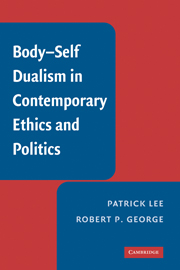4 - Abortion
Published online by Cambridge University Press: 27 July 2009
Summary
What is killed in an abortion? It is obvious that some living entity is killed in an abortion. And no one doubts that the moral status of the entity killed is a central (though not the only) question in the abortion debate. Is what is killed in abortion a distinct, living human individual? Is what is killed in abortion a person? Is what is killed in abortion the same type of entity as you and I? Once more, the issue of what you and I are, of what makes us be entities with full moral worth, or subject of rights, is central to a controversial and fundamental moral issue.
It is often claimed that the abortion debate is a disagreement between those who follow the hard facts of science and recognize that what science uncovers is important, on the one hand, and religious persons who think abortion is wrong because they have a religious belief in the soul and have accepted on faith that the soul is present from conception onward. But the reality is actually very close to the opposite of that picture. First, as we will show in a moment, what science says, in particular, the science of embryology, favors the pro-life side, not those who defend abortion. Second, it is the defenders of abortion who often identify – usually only implicitly – the self with a subject or a series of conscious states other than the living body, rather than the human, physical organism.
- Type
- Chapter
- Information
- Body-Self Dualism in Contemporary Ethics and Politics , pp. 118 - 150Publisher: Cambridge University PressPrint publication year: 2007



